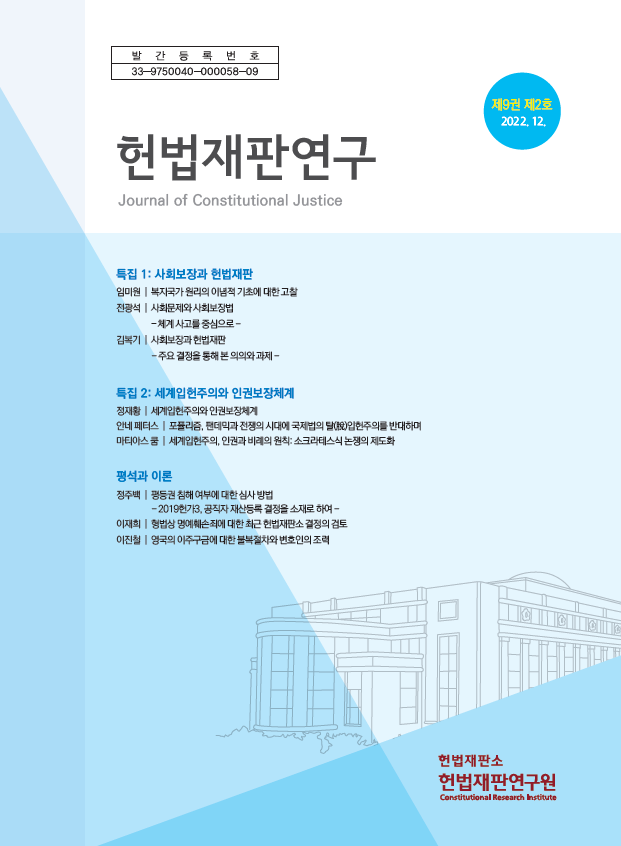학술논문
[특집2] 세계입헌주의, 인권과 비례의 원칙: 소크라테스식 논쟁의 제도화
이용수 0
- 영문명
- Global Constitutionalism, Human Rights and Proportionality: Institutionalizing Socratic Contestation
- 발행기관
- 헌법재판연구원
- 저자명
- 마티아스 쿰(Mattias Kumm)
- 간행물 정보
- 『헌법재판연구』제9권 제2호, 193~288쪽, 전체 96쪽
- 주제분류
- 법학 > 법학
- 파일형태
- 발행일자
- 2022.12.28
무료
구매일시로부터 72시간 이내에 다운로드 가능합니다.
이 학술논문 정보는 (주)교보문고와 각 발행기관 사이에 저작물 이용 계약이 체결된 것으로, 교보문고를 통해 제공되고 있습니다.

국문 초록
냉전 이후 권리 기반 사법심사의 확대와 함께 비례의 원칙 분석이 권리 논증의 핵심으로 등장한 양상
에 대해 세계입헌주의 학자들은 서술하고 분석해왔다. 그러나 이러한 사법 관행이 제기하는 핵심적인 질
문 중 하나는 그러한 관행의 법적 의미와 이같이 개방적인 사법적 기준을 적용하는 법원의 역할에 관한
것이다.
권리 기반 비례성 심사의 제도화는 플라톤의 초기 대화편을 유명하게 한 소크라테스의 논쟁과 비슷한
특징과 어려움을 공유한다. 소크라테스식 논쟁의 목표, 그리고 민주적 정치체제에서 소크라테스식 논쟁
이 하는 역할에 대한 이해는 비례성 기반 권리심사의 목적을 이해하는 열쇠이기도 하다.
법관이 비례성이라는 틀 속에서 인권이나 헌법적 권리를 판단할 때면 일차적으로는 권위 있는 원전의
해석이 아닌, 논리를 판단하는 작업을 하게 된다. 공권력에 의해 받아들여지고 시민들이 널리 찬동하는
입장을 법관이 비판적으로 검토하고 때로는 거부할 때면 소크라테스가 그랬듯 공동체의 가치관과 전통에
위배한다는 비판에 직면한 사실도 놀랄 일은 아니다.
비례성에 기반한 사법심사는 공권력 행사에 이의를 제기하고, 공적 이성에 근거한 정당화를 요구할 권
리를 제도화한다.
권리 기반 비례성 심사는 민주적 의사결정에 때때로 침투하는 네 가지 병리를 파악하기에 적합한 수단
이다. 첫째는 타당한 정책적 고려사항과 무관한 전통, 관습이나 선호에 근거한 제약이다. 둘째는 인권과
헌법적 권리 제약을 정당화하는 이유로서 허용되지 않는 “선(善)”을 이유로 한 제약이다. 셋째, 정부의 과
장이나 사상의 문제이다. 정부 정책이 정당한 목적과 대략적인 연관 관계는 있지만, 확실하고 구체적인
현실적 근거는 약한 경우를 가리킨다. 넷째, 자신들의 이익만을 추구하는(rent seeking, 지대추구 ※‘지대
추구’란 경제 주체들이 자신의 이익을 위해 기득권의 울타리 안에서 로비, 면허 취득, 독점권 취득 등 비
생산적인 활동에 경쟁적으로 자원을 낭비하는 현상이다.) 이익집단이 입법 절차를 포획하는 문제이다.
자신이 하는 논쟁 실천이야말로 민주적 정치체에서 최고의 찬사를 받아야 마땅하다는 소크라테스의
주장은 옳았다. 마찬가지로 권리 기반 비례성 심사를 하는 공정하고 독립적인 법원을 자유입헌민주주의
의 불가결한 요소로 포용해야 마땅하다. 쟁송권은 시민 참여 권한과 정부 책임 확보를 위한 핵심적 법적
장치로서 투표권을 보완한다.
영문 초록
Global Constitutionalists have described and analyzed how with the spread of rights
based judicial review after the end of the Cold War proportionality analysis has
become a central feature of reasoning about rights. Yet one of the core questions
such a practice raises concerns the legal point of such a practice and the role of
courts applying such an open ended test.
The institutionalization of a rights-based proportionality review shares a number
of salient features and puzzles with the practice of contestation that the Socrates
of the early Platonic dialogues became famous for. Understanding the point of
Socratic contestation, and its role in a democratic polity, is also the key to
understanding the point of proportionality-based rights review.
When judges decide human or constitutional rights cases within the proportionality
framework, they do not primarily interpret authority. They assess reasons. Not
surprisingly, they, like Socrates, have been prone to the charge that they offend the
values and traditions of the community, when they critically examine and sometimes
reject positions held by public authorities and widely endorsed by citizens.
Proportionality-based judicial review institutionalizes a right to contest the acts
of public authorities and demand a public reasons-based justification.
There are four types of pathologies that occasionally infect democratic
decision-making, that rights-based proportionality analysis is well suited to identify:
first, restrictions based on tradition, convention or preference that are not connected
tom plausible policy concerns. Second, restrictions based on reasons relating to “the
good”, w hich a re o ff limits a s a reason t o ju stify restrictions o f hu man and
constitutional rights. Third, the problem of government hyperbole or ideology. Here
government policies are loosely related to legitimate purposes, but they lack a firm
and sufficiently concrete base in reality. Fourth, there is the problem of capture
of the legislative process by rent seeking interest groups.
Socrates was right to insist that the practice of contestation he engaged in deserves the highest praise in a democratic polity. It is equally true that an impartial and
independent court engaged in rights-based proportionality review deserves to be
embraced as a vital element of liberal constitutional democracy. The right to contest
complements the right to vote as a core legal mechanism empowering citizens to
participate and ensuring that government is held accountable.
목차
키워드
해당간행물 수록 논문
- [특집1] 사회문제와 사회보장법 – 체계 사고를 중심으로 –
- [특집1] 사회보장과 헌법재판 - 주요 결정을 통해 본 의의와 과제 -
- [특집1] 복지국가 원리의 이념적 기초에 대한 고찰
- 평등권 침해 여부에 대한 심사 방법 - 2019헌가3, 공직자 재산등록 결정을 소재로 하여 -
- [특집2] 세계입헌주의와 인권보장체계
- 형법상 명예훼손죄에 대한 최근 헌법재판소 결정의 검토
- 영국의 이주구금에 대한 불복절차와 변호인의 조력
- [특집2] 포퓰리즘, 팬데믹과 전쟁의 시대에 국제법의 탈(脫)입헌주의를 반대하며
- [특집2] 세계입헌주의, 인권과 비례의 원칙: 소크라테스식 논쟁의 제도화
참고문헌
관련논문
법학 > 법학분야 BEST
- 인공지능 판사, 과연 가능한가?
- 정치의 사법화와 사법의 정치화 : 온건하고 실용적인 헌법재판의 당위성
- 자국 우선주의 정책과 국제법상 난민⋅이민자 보호-트럼프 행정부의 미국 우선주의를 중심으로-
법학 > 법학분야 NEW
더보기최근 이용한 논문
교보eBook 첫 방문을 환영 합니다!

신규가입 혜택 지급이 완료 되었습니다.
바로 사용 가능한 교보e캐시 1,000원 (유효기간 7일)
지금 바로 교보eBook의 다양한 콘텐츠를 이용해 보세요!



